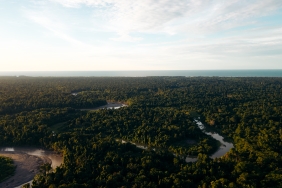WWF ENCOURAGES SUSTAINABLE INDUSTRY: SUSTAINABILITY ACTION PLAN ACTIVITIES IN FOUR MAJOR INDONESIAN CITIES
Some time ago WWF-Indonesia conducted a series of Sustainability Action Plan (SAP) activities in four major cities in Indonesia: Jakarta, Bandung, Yogyakarta, and Denpasar. This initiative aims to encourage downstream industries, especially tourism industry players such as hotels, restaurants, and cafes to be more active in supporting sustainability.
WWF's Role and Mission in the Tourism Industry
Irfan Bakhtiar Climate and Market Transformation Program Director WWF Indonesia, in his speech in Jakarta, Bandung, Yogjakarta, and Bali, explained that WWF concentrates not only on nature conservation but also on promoting environmentally friendly business practices. Given that tourism is one of the largest economic sectors in Indonesia, the role of the hotel and tourism industry is crucial in reducing environmental impacts. "Tourism is not just about the experience, but also how we protect the environment for future generations," he said.
The event highlighted the importance of adopting sustainability strategies in the day-to-day operations of the hotel and tourism industry. By implementing green practices, businesses reduce negative impacts on the environment and strengthen competitiveness in a global market that is increasingly aware of sustainability issues.
SAP Activities in Four Cities
WWF-Indonesia chose Jakarta, Bandung, Yogyakarta, and Denpasar (Bali) to host SAP activities because they are popular tourist destination cities in Indonesia. Each city had sessions tailored to its local context. However, the focus was on climate change and the transition to a green industry.
Jakarta, as the center of economy and government, participants were invited to understand the impact of climate change and understand further how their business can contribute to reducing carbon emissions. Government policies that support sustainability were also discussed, including the importance of implementing renewable energy in business operations.
Bandung, known for its creative industry was the venue to highlight the role of Small and Medium Industries (SMIs) in supporting sustainability. The Department of Industry and Trade (Disperindag) of West Java explained the policy and urgency of transitioning to a green industry. Participants were invited to formulate strategies that can be applied in everyday business, such as better waste management and the use of more environmentally friendly raw materials.
Yogyakarta, which is a city of culture and tourism, focused on materials regarding preserving the environment while promoting sustainable tourism. Participants were given insights on how they can reduce their carbon footprint with measures such as energy saving.
Denpasar, as an international tourist destination, has a great responsibility in preserving the environment. Here, attention is given to how hotels can reduce their environmental impact through sustainability initiatives such as more efficient water management.
Development of Action Plan
In addition to knowledge transformation sessions with trainers experienced in sustainability, each SAP event also includes a workshop where participants are invited to develop their sustainability action plan. In addition, WWF provides initial guidance by helping to set clear goals, measure the baseline conditions of their business, and set specific and measurable targets.
Evaluation of current business conditions is essential in establishing a baseline for future comparison. Next, participants can formulate concrete steps to achieve their sustainability targets. For example, a hotel may commit to reducing energy consumption by adopting technologies such as solar panels and motion sensors for lights.
In addition, every action taken should be evaluated in terms of its costs and benefits. This then helps the business to understand the financial impact and ensure economic viability. Assigning responsibility for implementing each initiative is critical to the success of a sustainability program.
Sustainability Initiatives in the Hotel Industry
In the presentation sessions, participants from various backgrounds shared sustainability initiatives that they have implemented. Some interesting examples include:
- Energy Use Reduction: Some hotels are committed to reducing electricity consumption by installing solar panels or using motion sensors for lights in common areas.
- Reduction of Single-Use Plastic Use: Replacing plastic water bottles with water dispensers in hotel hallways to reduce plastic waste.
- Better Waste Management: Turning organic waste into compost or working with third parties to recycle waste.
- Commitment to the use of sustainable raw materials: Through the use of eco-labeled or sustainably certified products such as RSPO will encourage responsible consumption
Towards a Sustainable Future
WWF-Indonesia hopes that through initiatives like SAP, more companies in Indonesia will adopt more sustainable business practices. This is not just about environmental responsibility, but also about creating a better future for future generations.
With commitment and action from all parties, we can all contribute to a greener and more sustainable future. The hotel and tourism industry, with its strategic position, has a vital role to play in leading this positive change. And the hospitality industry, with its vast reach, can spearhead the effort to achieve true sustainability.
Let's together start small steps towards big changes for a greener and more sustainable future.





